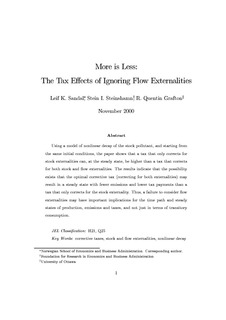More is less : the tax effects of ignoring flow externalities
Working paper
Permanent lenke
http://hdl.handle.net/11250/164051Utgivelsesdato
2000-11Metadata
Vis full innførselSamlinger
- Discussion papers (FOR) [566]
Sammendrag
Using a model of nonlinear decay of the stock pollutant, and starting from the same initial conditions, the paper shows that a tax that only corrects for stock externalities can, at the steady state, be higher than a tax that corrects for both stock and flow externalities. The results indicate that the possibility exists that the optimal corrective tax (correcting for both externalities) may result in a steady state with fewer emissions and lower tax payments than a tax that only corrects for stock externality. Thus, a failure to consider flow externalities may have important implications fior the time path and steady states of production, emissions and taxes, and not just in terms of transitory consumption.
Utgiver
Norwegian School of Economics and Business Administration. Department of Finance and Management ScienceSerie
Discussion paper2000:21
